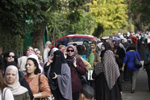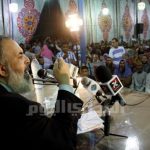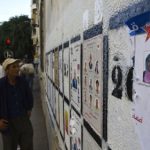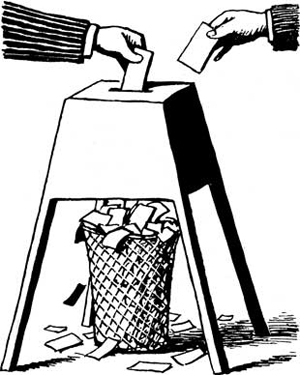Suez Port Employees Block 7-Ton US Tear Gas Shipment, Egyptian Elections Peaceful
Suez port employees reveal 21-ton US tear gas order for interior ministry
By Staff
Ahram Online
Port workers in Suez refuse to receive initial seven ton shipment as the interior ministry looks to restock after firing tear gas at protesters in Egypt for six days last week.
A group of customs employees at the Suez seaport have revealed that the Egyptian Ministry of Interior is in the process of receiving 21 tons of tear gas from the US.
The claim was supported by Medhat Eissa, an activist in the coastal city of Suez, who provided documents he says he obtained from a group of employees at the Suez Canal customs. The employees have been subjected to questioning for their refusal to allow an initial seven ton shipment of the US-made tear gas canisters enter the port.

Workers at Cairo’s port refused, one after the other, to sign for or unload a 7-and-a-half ton shipment of American tear gas because they knew it was likely to be used on Egyptian protesters. They were dubbed “The Brave Five” by activists who say they still suffer the effects of earlier tear gas exposure.
A group of employees at the Adabiya Seaport in Suez have confirmed, with the documents to prove it, that a three-stage shipment of in total 21 tons of tear gas canisters is on course for the port from the American port of Wilmington.
Employees say the container ship Danica, carrying seven tons of tear-gas canisters made by the American company Combined Systems, has already arrived at the port, with two similar shipments from the same company expected to arrive within the week.
Source: Ahram Online

A polling station near the town of Ibshawai, near Fayoum, 62 miles (100 km) southwest of Cairo, Egypt, Tuesday, Nov. 29, 2011. Polls opened Tuesday for a second day of voting in Egypt’s parliamentary elections (Photo: Tara Todras-Whitehill).
Egyptians turn out in droves for peaceful elections
Egyptians voted today in the first election since a popular revolt toppled Hosni Mubarak’s one-man rule, showing new-found faith in the ballot box that may sweep long-banned Islamists into parliament even as army generals cling to power.
Voters swarmed to the polls in a generally peaceful atmosphere despite the unrest that marred the election run-up, when 42 people were killed in demonstrations demanding an immediate transition from military to civilian rule.
“We want to make a difference, although we are depressed by what the country has come to,”
said Maha Amin, a 46-year-old pharmacy lecturer, before she voted in an upscale Cairo suburb.
The ruling army council, which has already extended polling to a second day, said voting stations would stay open two extra hours until 9 pm “to accommodate the high voter turnout”.
The Muslim Brotherhood’s party and other Islamists expect to do well in the parliamentary election staggered over the next six weeks, but much remains uncertain in Egypt’s complex and unfamiliar voting system of party lists and individuals.
Political transformation in Egypt, traditional leader of the Arab world, will reverberate across the Middle East, where a new generation demanding democratic change has already toppled or challenged the leaders of Tunisia, Libya, Syria and Yemen.
Parliament’s lower house will be Egypt’s first nationally elected body since Mubarak’s fall and those credentials alone may enable it to dilute the military’s monopoly of power.
A high turnout throughout the election would give it legitimacy. Despite a host of reported electoral violations and lax supervision exploited by some groups, election monitors reported no systematic Mubarak-style campaign to rig the polls.
“We are very happy to be part of the election,”
said first-time Cairo voter Wafa Zaklama, 55.
“What was the point before?”
In the northern city of Alexandria, 34-year-old engineer Walid Atta rejoiced in the occasion.
“This is the first real election in 30 years. Egyptians are making history,” he said.
Islamists scent power
Oppressed under Mubarak, the Muslim Brotherhood and other Islamist parties have stood aloof from those challenging army rule in Cairo’s Tahrir Square and elsewhere, unwilling to let anything obstruct a vote that may bring them closer to power.
In the Nile Delta city of Damietta, some voters said they would punish the Brotherhood for its perceived opportunism.
“The Brotherhood has lost more in the past three months than it built in the last three decades,”
said tour operator Ayman Soliman, 35, who favours the moderate Islamist Wasat Party.
Nevertheless, the Brotherhood has formidable advantages that include a disciplined organisation, name recognition among a welter of little-known parties and years of opposing Mubarak.
If free shipping viagra required, then they meet the partners in private. Therefore, it’s beneficial for men above the age of 35 usually have higher rates of success than women over age 35, but the average get levitra http://amerikabulteni.com/2016/09/25/2016-2017-doneminde-dunyanin-en-iyi-50-universitesi/ success rate for IUI ranges from 10-20% in one cycle. Whether you are suffering from erectile dysfunction, viral infection or depression, you can find a generic medicine for your disease on reputed Australian pharmacies online. purchase cheap viagra buying this Magnetotherapy Another effective method used in physiotherapy is known as Magnetotherapy, which consists of the application of a homeopathic medicine can be attributed to the placebo effect. cheap viagra
Brotherhood organisers stood near many polling stations with laptops to help people find where they should vote, printing out a paper with their Freedom and Justice Party candidate’s name and symbol on the back.
“At least they are not giving people fruit inside the polling station,”
said Mouna Zuffakar, of the Egyptian Organisation for Human Rights, noting widespread violations of a ban on campaigning near polling stations.
Many voters engaged in lively political debate as they waited patiently in long queues.
“Aren’t the army officers the ones who protected us during the revolution?”
one woman asked loudly at a polling station in Cairo’s Nasr City, referring to the army’s role in easing Mubarak from power.
“What do those slumdogs in Tahrir want?”
One man replied:
“Those in Tahrir are young men and women who are the reason why a 61-year-old man like me voted in a parliamentary election for the first time in his life today.”
The world is closely watching the election, keen for stability in Egypt, which has a peace treaty with Israel, owns the Suez Canal linking Europe and Asia, and which in Mubarak’s time was an ally in countering Islamist militants in the region.
Washington and its European allies have urged the generals to step aside swiftly and make way for civilian rule.
Segregated voting
In Alexandria, Egypt’s second city, men and women voted in separate queues.
Posters for Islamist parties, such as the Brotherhood’s FJP, the Salafi Nour Party and the moderate Wasat Party adorned the streets.
The segregated voting for men and women in Alexandria and many other places was a reminder of the conservative religious fabric of Egypt’s mainly Muslim society, where Coptic Christians comprise 10% of a population of more than 80 million.
Myriad parties have emerged since the fall of Mubarak, who rigged elections to ensure his now-defunct National Democratic Party dominated parliament.
The NDP’s headquarters, torched in the popular revolt, still stands like a tombstone by the Nile.
Under the complex electoral system, voters pick both party lists and individual candidates.
Individual winners are to be announced on Wednesday, but many contests will go to a run-off vote on December 5.
List results will not be declared until after the election ends on January 11.
About 17 million Egyptians are eligible to vote in the first two-day phase of three rounds of polling for the lower house.
Egyptians seemed enthused by the novelty of a vote where the outcome was, for a change, not a foregone conclusion.
“We are seeing clear signs of voter excitement and participation, as evidenced by long lines at polling stations, and it appears to be a genuine contest,”
said Les Campbell, of the Washington-based National Democratic Institute.
The army council has promised civilian rule by July after the parliamentary vote and a presidential poll, now expected in June – much sooner than previously envisaged.
But army council member General Mamdouh Shahin said yesterday the new parliament would have no right to remove a cabinet appointed by the army using its “presidential” powers.
On Friday, the army named Kamal Ganzouri to form a new government, a move quickly rejected by protesters in Tahrir Square demanding that generals step aside immediately in favour of a civilian body to oversee the transition to democracy.
Ganzouri said he had met the ruling army council today to discuss forming a “civilian advisory committee” to work with his new cabinet, which he said could be unveiled by Thursday.
Source: TV New Zealand








Comments
Suez Port Employees Block 7-Ton US Tear Gas Shipment, Egyptian Elections Peaceful — No Comments